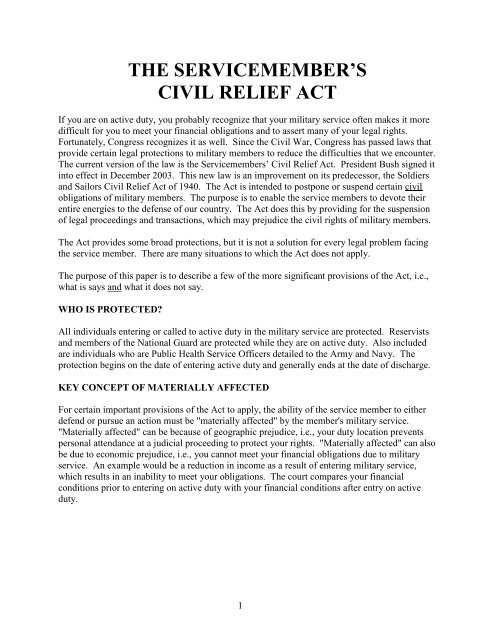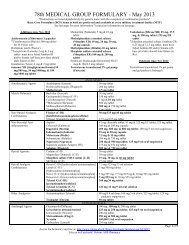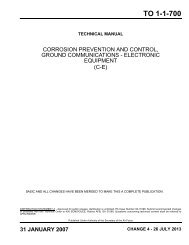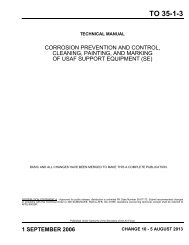THE SERVICEMEMBER'S CIVIL RELIEF ACT - Robins Air Force Base
THE SERVICEMEMBER'S CIVIL RELIEF ACT - Robins Air Force Base
THE SERVICEMEMBER'S CIVIL RELIEF ACT - Robins Air Force Base
You also want an ePaper? Increase the reach of your titles
YUMPU automatically turns print PDFs into web optimized ePapers that Google loves.
<strong>THE</strong> SERVICEMEMBER’S<br />
<strong>CIVIL</strong> <strong>RELIEF</strong> <strong>ACT</strong><br />
If you are on active duty, you probably recognize that your military service often makes it more<br />
difficult for you to meet your financial obligations and to assert many of your legal rights.<br />
Fortunately, Congress recognizes it as well. Since the Civil War, Congress has passed laws that<br />
provide certain legal protections to military members to reduce the difficulties that we encounter.<br />
The current version of the law is the Servicemembers’ Civil Relief Act. President Bush signed it<br />
into effect in December 2003. This new law is an improvement on its predecessor, the Soldiers<br />
and Sailors Civil Relief Act of 1940. The Act is intended to postpone or suspend certain civil<br />
obligations of military members. The purpose is to enable the service members to devote their<br />
entire energies to the defense of our country. The Act does this by providing for the suspension<br />
of legal proceedings and transactions, which may prejudice the civil rights of military members.<br />
The Act provides some broad protections, but it is not a solution for every legal problem facing<br />
the service member. There are many situations to which the Act does not apply.<br />
The purpose of this paper is to describe a few of the more significant provisions of the Act, i.e.,<br />
what is says and what it does not say.<br />
WHO IS PROTECTED?<br />
All individuals entering or called to active duty in the military service are protected. Reservists<br />
and members of the National Guard are protected while they are on active duty. Also included<br />
are individuals who are Public Health Service Officers detailed to the Army and Navy. The<br />
protection begins on the date of entering active duty and generally ends at the date of discharge.<br />
KEY CONCEPT OF MATERIALLY AFFECTED<br />
For certain important provisions of the Act to apply, the ability of the service member to either<br />
defend or pursue an action must be "materially affected" by the member's military service.<br />
"Materially affected" can be because of geographic prejudice, i.e., your duty location prevents<br />
personal attendance at a judicial proceeding to protect your rights. "Materially affected" can also<br />
be due to economic prejudice, i.e., you cannot meet your financial obligations due to military<br />
service. An example would be a reduction in income as a result of entering military service,<br />
which results in an inability to meet your obligations. The court compares your financial<br />
conditions prior to entering on active duty with your financial conditions after entry on active<br />
duty.<br />
1
WHAT ARE SOME OF <strong>THE</strong> PROTECTIONS?<br />
1. Leases - You may terminate a lease if you meet 2 (two) conditions<br />
a. You entered into the lease before you started active duty.<br />
b. You or your dependents occupied the leased premises.<br />
To terminate the lease, you must deliver written notice to the landlord after you are called to<br />
active duty (i.e., you receive orders). Oral notice is NOT enough. If you think you qualify and<br />
want to use this provision to terminate your lease, come into the legal office. We can help you<br />
draft your written notice and explain the fairly complex rules on when the lease will terminate.<br />
With residential leases, an active duty service member who has received PCS orders or who is<br />
being deployed for 90 days or more may terminate a housing lease, provided the member gives<br />
the landlord 30 days WRITTEN notice.<br />
With AUTOMOBILE leases, an active duty service member who has received PCS orders or<br />
who is being deployed for 180 days or more may terminate an automobile lease. The member<br />
must provide WRITTEN notice of termination to the lessor and return the vehicle within 15 days<br />
of written notice. Previously, there was no right to terminate an automobile lease.<br />
2. Rent and Eviction<br />
Landlords cannot, except with permission from a court, evict your dependents from rental<br />
housing when the agreed rent does not exceed $2932.31 per month. If your rent is in excess of<br />
$2932.31 per month, come see the legal office.<br />
3. Installment Contracts and Mortgage Foreclosing<br />
If, prior to entering active duty, you entered into an installment contract to purchase real or<br />
personal property, the Act will protect you if your ability to pay is "materially affected" by your<br />
military service. Note that you must have paid a deposit or installment prior to active duty. If<br />
so, then the seller cannot, unless authorized by the court, rescind, terminate or repossess the<br />
property.<br />
In addition, the Act protects you against foreclosure of mortgages as long as the following apply:<br />
a. It is a mortgage/trust deed/other security<br />
b. Your obligation originated prior to your entry on active duty.<br />
c. You or a family member owned the property prior to entry on active duty.<br />
d. You or your family member still owns the property.<br />
2
e. Your ability to meet the financial obligation (pay the loan) is materially affected by your<br />
entry on active duty.<br />
f. Additionally, motor vehicles fall within the umbrella of installment contract protections.<br />
If a military member falls behind on car payments, the lessor must obtain a court order before<br />
repossessing the car. Previously, there was no requirement for a court order for repossession.<br />
g. Cell phone installment contract are also protected. Under the Veterans’ Benefits<br />
Improvement Act, these contracts may be cancelled or suspended if the servicemember is<br />
deployed overseas for 90 days or longer or if he makes a permanent change-of-station (PCS)<br />
move. The servicemember may cancel or suspend the cell phone contract without penalties or<br />
extra fees. Contact the Legal Assistance Office at 926-9276, if you have any questions or need<br />
help cancelling your cell phone contract.<br />
4. Default Judgments<br />
A default judgment is a judgment against you because you failed to respond to a lawsuit or<br />
appear at trial. The Act provides you with some protection against default judgments. Before a<br />
court can enter a default judgment against you, the person suing you must provide the court with<br />
a sworn statement that you are not in military service. If he/she does not and you are in the<br />
military, then the court will appoint an attorney to protect your interest (usually by seeking a<br />
delay in the proceedings). Notice of military status alone, will not prevent a default judgment.<br />
The court may also require the person suing you to post a bond to protect you against harm.<br />
Finally, if there is a default judgment against you, then the judgment will be reopened (you get<br />
another chance) if you (1) make a request within 90 days of returning from TDY, etc., or leaving<br />
active duty, (2) show that you were prejudiced and (3) show that you had a defense.<br />
If you are in the military and you do not appear for you case, the Court must grant a stay of at<br />
least 90 days. Defense to the action requires your presence if your appointed counsel is unable to<br />
contact you in order to determine if there is a valid defense to your claim. Even with all of these<br />
protections, you need to be careful when there is a judgment against you. If you fail to exercise<br />
these protections or exhaust all of your protections a default judgment will stand. Even if a<br />
default judgment is overturned, this action does not impair any rights or title acquired by a bona<br />
fide purchaser for value under the default judgment. This means that if you had a default<br />
judgment against you, but property of yours was sold to an individual who had no idea of the<br />
judgment against you, this individual would get to maintain possession of your property.<br />
5. Stay of Proceeding<br />
The Servicemembers' Civil Relief Act provides for an automatic nondiscretionary stay of civil<br />
proceedings upon application of the servicemember. A “stay” is similar to a “postponement” or<br />
“hold status”. A stay of proceedings will be granted, so long as you can show that your ability to<br />
defend or pursue the action was materially affected by your military service. The stay can last<br />
for a maximum of 90 days plus three months after your return from military service. You may<br />
even apply for an additional stay after this amount of time has passed. It would be up to the<br />
court’s discretion as to whether or not to grant your request for stay. A Stay Application must<br />
3
include the following: 1) A letter which shows that the military duty materially affects the<br />
servicemember's ability to appear; 2) The date that the servicemember can appear; and 3) a letter<br />
from the servicemember’s commanding officer stating that the servicemember’s military duty<br />
prevents appearance and that military leave is not authorized for the servicemember at the time<br />
of the letter. Penalties or fines may not accrue during the period of the stay; however, the statute<br />
of limitations may not be stopped during military service.<br />
6. Taxation<br />
The Act provides military members with certain protections from otherwise applicable state<br />
income tax. Basically, the rule is that your state of legal domicile may tax you. But, because of<br />
the protection of the Act, your legal domicile is not changed solely by virtue of your military<br />
service. Also, the Act provides that collection of income tax may be deferred for the period of<br />
military service plus six months if your ability to pay is impaired by military service. Also, your<br />
properties cannot be sold to satisfy a tax obligation except on application to a court. The court<br />
will then determine if a stay is appropriate. Military income may only be taxed by a<br />
servicemember’s homestate. If the spouse works, the government may not use military income<br />
to determine her tax rate. Real property taxes, business property taxes, and intangible personal<br />
property may be taxed by the host state. Tangible personal property may not be taxed except if<br />
located within the servicemember’s residence or used in trade or business.<br />
7. Maximum Rate of Interest<br />
The Act provides that, if prior to entering the service, you secure a loan or obligation with an<br />
interest rate in excess of 6%, you will not be obligated to pay interest at a rate greater than 6%<br />
during any period of military service, unless the court finds that your ability to pay has not been<br />
materially affected. This includes credit cards. You have to make a request to take advantage of<br />
the provisions. See attachment 1 for a sample letter. Federal student loans are not covered by<br />
this section, but the servicemember may apply for a forbearance or deferment.<br />
Finally, the Act only applies to loans prior to entering service. So it really is aimed at reservists.<br />
But the two largest mortgage investors Federal National Mortgage (Fannie Mae) and Federal<br />
Home Loan Mortgage Corp. (Freddie Mac) are extending the coverage to career military<br />
personnel who may be faced with hardships. Fannie Mae and Freddie Mac do not control all<br />
mortgages, but they do affect a lot of them. Other mortgage investors may follow their lead. So,<br />
if you are struggling with your mortgage, you should contact the legal office and we will help<br />
you contact your lender.<br />
8. Stay of Execution of Judgments/Attachments<br />
The court may stay the execution of judgments, court action, attachments, or garnishments. If<br />
you request a stay, then it must be granted unless the court finds that your ability to comply with<br />
the order or judgment was not materially affected by your military status.<br />
4
9. Statute of Limitations<br />
The Statue of Limitations is a concept in the law which says that after a certain time, you cannot<br />
sue someone. For example, if the statue of limitations for automobile negligence is three years,<br />
then after the three years from the accident you cannot sue. The Act affects the Statue of<br />
Limitations by saying that your time in service suspends (tolls) the running of the time limit. So<br />
your time in service cannot be used to compute the time limits for bringing any action by or<br />
against you. This provision does not apply to time limitations under the federal tax laws.<br />
10. Insurance<br />
Your private life insurance policy is protected against lapse, termination, and forfeiture for<br />
nonpayment of premiums or of any indebtedness for the period of military service plus two<br />
years. You or your beneficiary must make an application to the Veterans Administration for the<br />
protection. You are limited to $250,000 coverage. Unpaid premiums/interest are deducted from<br />
your benefit.<br />
11. Professional Liability Insurance Protection<br />
Those who are engaged in providing health-care-services, or other services determined by the<br />
Secretary of Defense to be professional service, may have their professional liability insurance<br />
suspended upon written request. Such health-care personnel may have coverage reinstated upon<br />
request within thirty (30) days after release from active duty. Further, civil and/or administrative<br />
actions for damages based on professional negligence shall be stayed during active duty until<br />
liability insurance is reinstated after release. Finally, if the health-care provider dies on active<br />
duty, the professional insurance carriers shall be liable for claims suspended because of military<br />
service as if the health-care provider continued the policy in full force.<br />
12. Lenders/Creditors/Insurers<br />
This entity can not determine if you are unable to pay; deny or revoke credit; change terms of<br />
existing arrangement; refuse terms or limits of new arrangement; make adverse credit reports or<br />
refuse insurance. You must still make your required payments; however if the entity does not<br />
follow this Act the entity is liable under the Fair Credit Reporting Act.<br />
13. Extension of Benefits to your Dependents<br />
Dependents are entitled to benefits upon application to a court. That is unless the dependent’s<br />
ability to comply with the terms has not been materially impaired by reason of the military<br />
service of the person upon whom the applicant depends.<br />
5
Dear ______________________,<br />
The President of the United States has exercised his authority under 10 U.S.C. 673(b) to<br />
order certain Reserve Component personnel to active duty. I am one of those being called to<br />
active duty by the President. Enclosed is a copy of my orders.<br />
I am entitled to certain protections under the Servicemembers’ Civil Relief Act, signed by<br />
President Bush on 19 Dec 03, as a result of my call to active military service and the material<br />
impact it will have on my financial income.<br />
Pursuant to the Servicemembers’ Civil Relief Act, please immediately reduce the amount<br />
of interest on my debt to 6 percent, effective retroactively to the date I was ordered to active<br />
duty. This 6 percent per annum ceiling on interest charges includes service charges, renewal<br />
charges and fees as well. Additionally, the difference between 6 percent and my present interest<br />
rate must be forgiven, not deferred or accrued in accordance with the Servicemembers’ Civil<br />
Relief Act.<br />
Please be further advised that you may not repossess property for nonpayment of an<br />
installment obligation without first complying with the provisions of Servicemembers’ Civil<br />
Relief Act.<br />
My account number is _______________________________<br />
Thank you for your time and assistance.<br />
Sincerely,<br />
6
















